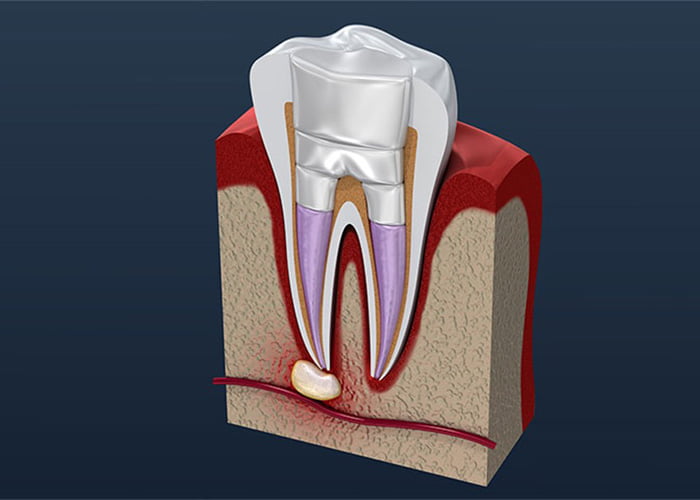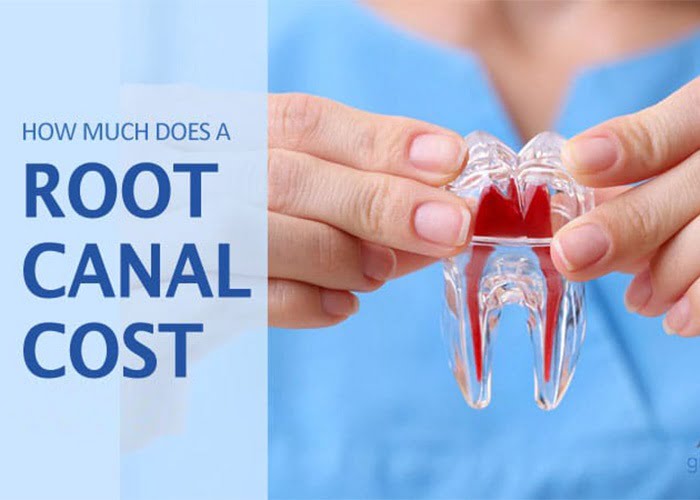If you need a root canal, you may be wondering how much does a root canal cost. Our article helps you make an informed decision about your dental care.
What Is a Root Canal?
A root canal is a dental procedure that removes the infected or damaged pulp (soft tissue) from the inside of a tooth. The pulp is the innermost part of the tooth that contains nerves, blood vessels, and connective tissue. When the pulp becomes infected or inflamed due to decay, trauma, or other reasons, it can cause pain and discomfort.
Root canal procedures are a common and safe procedure that can save the natural tooth and prevent further damage to the tooth and surrounding tissues. The dentist or endodontist will numb the area around the tooth and make an opening in the top of the tooth to access the pulp chamber. After removing the infected or damaged pulp, the dentist will fill the space with a special material and seal the opening with a filling or crown.
Root canal therapy is typically needed when the pulp inside a tooth becomes infected or inflamed. This can happen for several reasons, including:
- Tooth decay: If decay reaches the pulp of a tooth, it can cause an infection.
- Trauma: If a tooth is injured, the pulp can become damaged, infected, or inflamed.
- Cracked or broken tooth: If a tooth is cracked or broken, the pulp can become exposed to bacteria and can become infected.
- Large fillings: Large fillings can weaken the tooth and make it more susceptible to infection.
- Gum disease: Gum disease can cause the gums to pull away from the teeth, exposing the roots and leading to infection.
Symptoms that may indicate the need for a root canal include:
- Severe tooth pain
- Sensitivity to hot or cold temperatures
- Swelling around the tooth
- Discoloration of the tooth
- Tender or swollen gums
See more: What to Eat After a Root Canal?
How Much Does a Root Canal Cost With Insurance?
The average cost of a root canal without insurance can range from $620 to $1,472, depending on the location and type of tooth being treated.
- A front tooth can range from $620 to $1,100
- Bicuspid (mid-mouth) can range from $705 to $1,250
- Molar can range from $870 to $1,472.
These costs are for the root canal procedure only and do not include any additional costs. If you do not have dental insurance, it is important to discuss the costs and payment options with your dentist. Some dentists may offer payment plans or discounts for patients without insurance, which can help to make the procedure more affordable.
How Much Does a Root Canal Cost Without Insurance?
The average cost of a root canal procedure with insurance can range from $200 to $1,472, depending on the type of tooth being treated. Typically, insurance plans cover a percentage of the cost, with the remaining cost being the responsibility of the patient.
- Front tooth: $200- $1,100
- Bicuspid (mid-mouth): $200-$1,250
- Molar: $300-$1,472″
Insurance typically covers 50% to 80% of the cost of a root canal procedure, but there may be additional costs such as X-rays or dental crowns. Some insurance plans may have waiting periods or limitations on coverage for certain procedures, so it is important to review your plan carefully to understand coverage and any associated costs.

What Factors Influence the Cost of Root Canals?
The cost of a root canal procedure can vary depending on several factors. Here are some of the factors that can influence the cost of a root canal.
Type and Location of the Tooth
The type and location of the tooth being treated can impact the cost of a root canal. For example, molars tend to be more difficult to treat than front teeth, so a root canal on a molar may be more expensive than a root canal on a front tooth.
The Difficulty of the Root Canal
The extent of the damage or infection in the tooth can affect the cost of the root canal procedure. A more complex or severe case may require more time and resources, and thus a higher cost.
A General Dentist or an Endodontist
General dentists can perform root canals, but some complex cases may require the expertise of an endodontist, a root canal specialist. Endodontists tend to charge more for their services than general dentists.
Additional Costs
After the root canal treatment is complete, your tooth may require additional services, such as a temporary filling, build-up, or crown. These services are separate expenses you must consider before receiving a root canal.
The Region You Live In
The cost of living and the cost of dental services can vary widely depending on the region you live in. For example, if you live in a large urban area, you may pay more for a root canal than someone who lives in a rural area.
What’s Included in Root Canal Costs?
The cost of a root canal typically includes several components such as the consultation fee, X-rays, anesthesia, the actual procedure, and any necessary follow-up visits. The price can also vary depending on the location of the tooth, the severity of the infection, and whether or not a specialist, such as an endodontist, is needed. It’s important to note that the cost of a root canal may also vary depending on your insurance coverage or if you are eligible for any discounts or payment plans offered by your dental provider.

How to Get Help With the Cost of a Root Canal
If you need a root canal, there are several ways to get help. These include joining a dental discount plan and looking into government-assisted programs like Medicaid, Medicare, CHIP, or Donated Dental Services (DDS).
Additionally, many dental schools offer discounted procedures, including root canals, as part of their training programs. These programs are supervised by experienced dentists, allowing patients to receive quality care at a lower cost.
Read more: Signs of infection after root canal
Frequently Asked Questions
Here are some frequently asked questions about root canal costs
Is it cheaper to get a root canal or extraction?
The cost of a root canal and extraction can vary depending on the tooth’s location, the severity of the damage, and other factors. In general, a root canal tends to be more expensive than an extraction. However, it’s important to note that preserving a natural tooth through a root canal may be a better long-term solution for dental health.
What happens if I can’t afford a root canal?
If you cannot afford a root canal, there are options available to help you get the care you need. You can explore low-cost or free dental care options, such as dental discount plans, government-assisted programs like Medicaid or CHIP, donated dental services, or discounted treatment at dental schools. You can also talk to your dentist about payment plans or financing options that may be available.
Can I get a root canal for free?
Programs such as Donated Dental Services (DDS), dental schools, and government-assisted programs may offer free or low-cost root canal treatment. Ask your dentist about payment plans or financing options to make the cost of the procedure more manageable.
Contact us
If you’re looking for a dentist Marysville, Ohio is the perfect place to find accurate and current information on the cost of a root canal procedure. They offer a detailed breakdown of costs, discounts, and payment plans, and you can easily schedule an appointment or consultation to learn more. Their contact information is available online or on their website.




One Response
How you doing my name is Crystal I’m trying to find out how much is it for the front root canal? Can you call me back at 267-888-1447